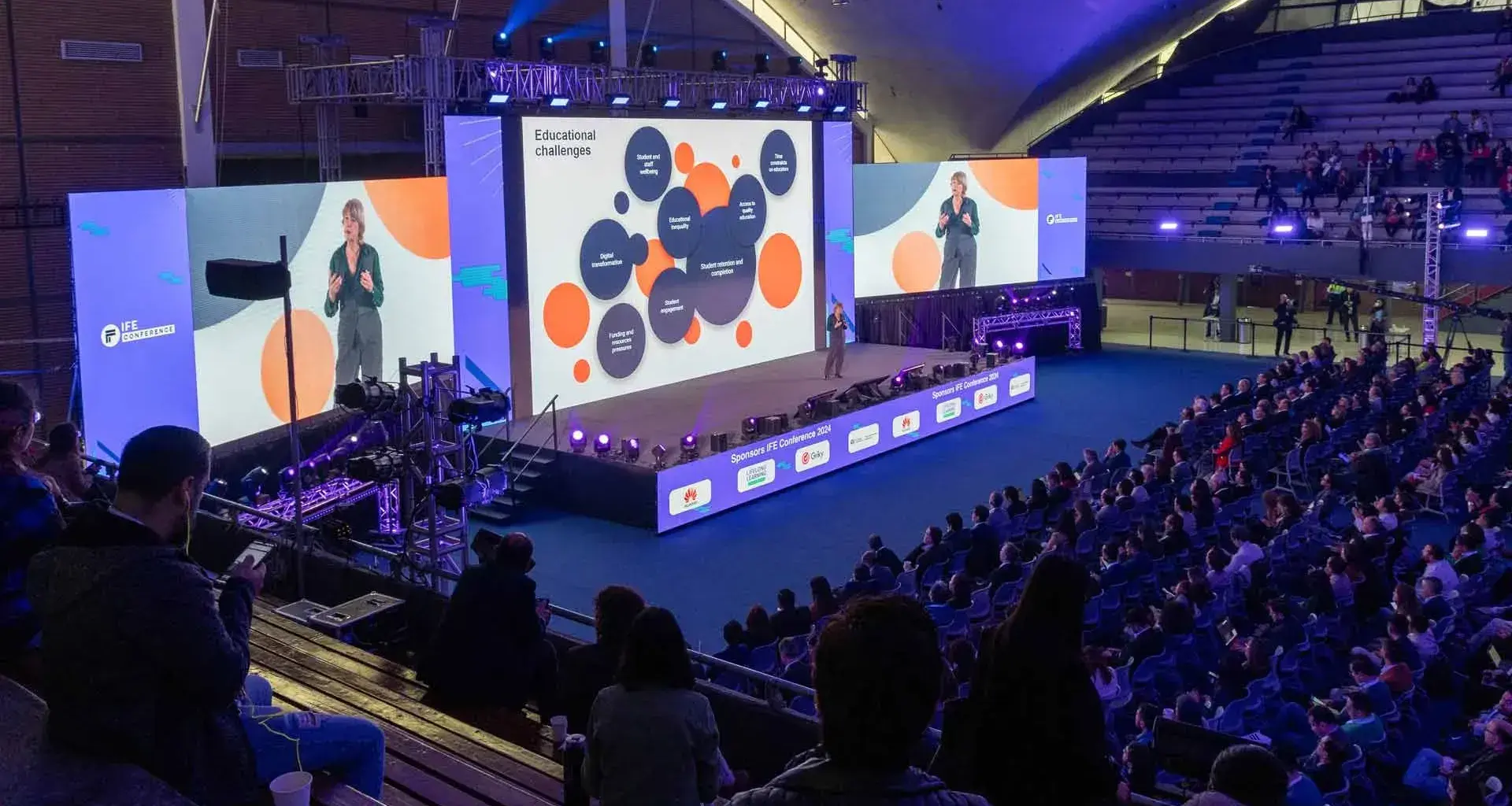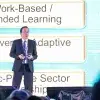The latest global education trends were discussed at IFE Conference 2024, Tec de Monterrey’s international education conference.
This event, which hosted 350 activities designed around learning, collaboration, and innovation, had the central theme of “Education in the era of artificial intelligence.”
The tenth edition of this conference, formerly known as the International Conference on Educational Innovation (CIIE for its initials in Spanish), offered lectures, presentations, special events, panels, and networking spaces, among other events.
In this article, CONECTA reports on some of the ideas on educational innovation discussed at this conference, organized by the Tec’s Institute for the Future of Education.
The role of artificial intelligence in education
Dr. Rose Luckin, a professor at the UCL Knowledge Lab in London, explained three key aspects regarding artificial intelligence (AI) that education professionals can focus on:
- Artificial intelligence tools
- Maximizing human intelligence
- Artificial intelligence education
The first concerns tools that allow teachers to reduce the time spent on repetitive tasks.
The second focuses on the idea of using tools to enhance students’ intelligence and not to replace it with artificial intelligence.
And the third has to do with teaching students about artificial intelligence itself so that they learn to use it effectively, safely and ethically.
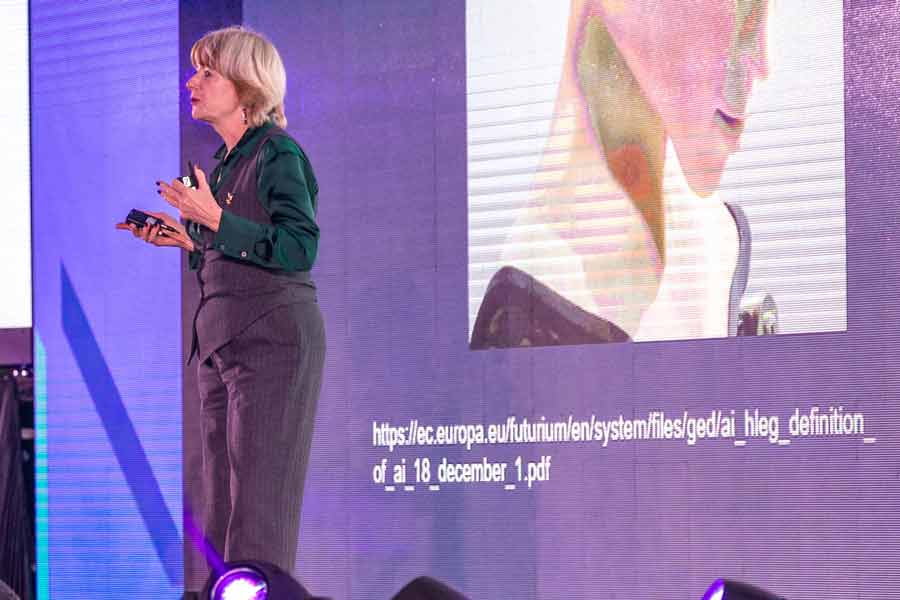
Artificial intelligence as a teaching assistant
Large language models (like ChatGPT) are a type of generative AI that has already become popular and can be useful time-savers for teachers, noted Ryan Baker from the University of Pennsylvania,
“These models essentially provide learning support through teaching assistants that are able to answer questions and interact with students,” he said.
“These new AI assistants save teachers time and give students more immediate answers”, he added.
Multidisciplinary teachers who explore AI
Academics Jordi Torras, Francisco José García Peñalvo, and José Mayorga agreed that a fundamental step in AI teacher training, regardless of the field, involves becoming familiar with non-natural languages.
Given that digital transformation inevitably involves bringing AI into the classroom, García Peñalvo believes that learning to use it is vital to bridge the digital divide.
“The biggest enemy of digital transformation in education is teachers who refuse to let their students use AI, which is on a par with students who misuse it.”
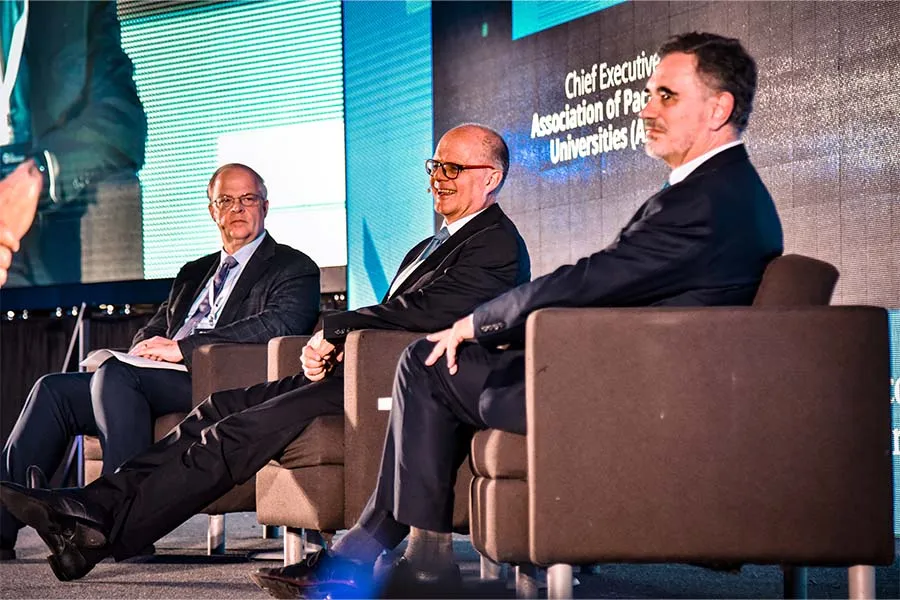
The trend of lifelong learning
Michael Fung, executive director of the Institute for the Future of Education, spoke about lifelong learning during his inaugural address.
Fung said that this type of learning has undergone significant growth due to demand for skills in the labor market.
“We have seen growing global recognition of the importance of lifelong learning opportunities that reach broader segments of the workforce and population,” he said.
The executive pointed out that nations around the world are currently investing in long-term projects to rebuild supply chain capabilities through new skills in the industrial sector and the labor market.
He went on to say that there is more demand for talented people with experience in STEM areas (science, technology, engineering, and mathematics).
- FAIR: four key principles for transforming education
As part of the continuing education vision promoted by Tec de Monterrey, the FAIR model aims to address lifelong learning with a more flexible, adaptable, inclusive, and relevant approach.
The FAIR model aims to create more appropriate learning modalities with a variety of development paths for all types of people aligned with the changing needs of both industry and society.
Some examples of this involve the creation of alternative credentials whose purpose is to provide more affordable, shorter certification programs with a more employability-oriented approach outside the traditional academic degree framework.
“We want university institutions to serve as a bridge between traditional education and new models, and to become companions who will support you throughout your career and your life,” said the speaker.
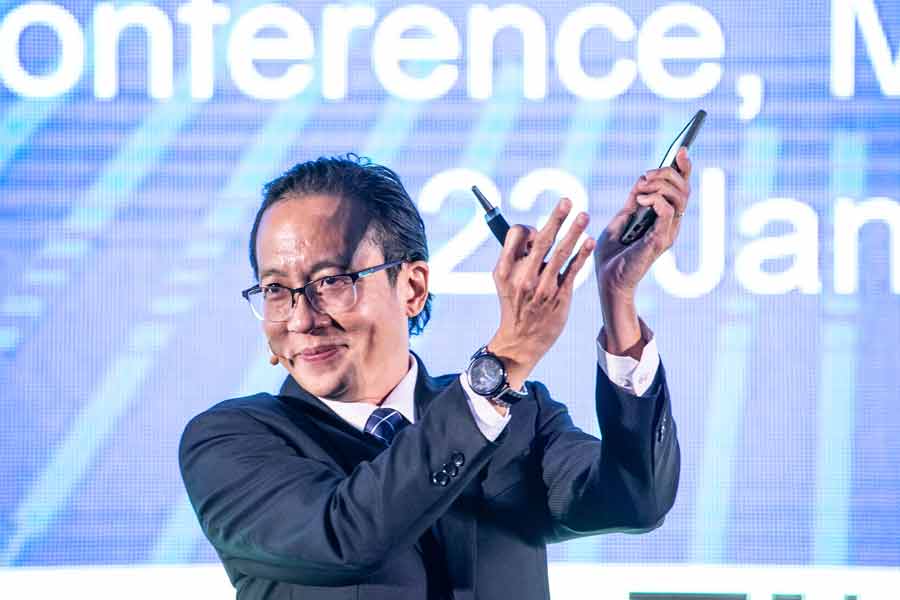
Alternative specialized certifications
Ignacio Villaverde, rector of the University of Oviedo, said that universities must now focus on creating alternative certifications that empower specialization.
Villaverde said these alternative certifications complement skills with competencies.
“We can’t offer twentieth-century solutions to the new employment challenges of the twenty-first century,” said Vicente Atxa, Rector of Mondragon University.
Competency-based learning
Michael Fung, Director General of the IFE, addressed the need for institutions to respond to rapidly changing needs and an evolving technological landscape.
“A competency-based education model will be very helpful by providing flexibility and agility as we look at evolving competency needs,” he commented.
Scott Pulsipher, president of Western Governors University (WGU), explained that competency-based educationrecognizes that the world will pay you for what you can do with your knowledge.
“It’s not just a case of possessing knowledge, but demonstrating that you are competent to apply it,” he said.
Fung noted that another important reflection in this regard concerns climate action and sustainable development, in addition to leveraging technology to enable cross-cultural learning.

Cyber-physical learning alliance
The purpose of cyber-physical learning is to bring digital and physical worlds together to provide immersive and interactive learning experiences.
The Tec has set up the Cyber-Physical Learning Alliance with Singapore University of Technology and Design(SUTD), Aalto University, Hong Kong University of Science and Technology (HKUST), and Zhejiang University to bring students in classroom and virtual environments together.
“Cyber-physical learning combines technology with a human-centric approach that involves socialization, peer-to-peer learning, student wellbeing, ethics, data privacy and more,” commented Chong Tow Chong, president of SUTD.
The importance of emotional education
Mónica Duarte, Myriam Villarreal, Elia Mendoza, and Laura Zepeda, who work in the Educational Innovation and Digital Learning area at Tecnológico de Monterrey, agree that traditional teaching practices have forgotten about emotional education and wellbeing.
The panelists shared tips on how to enhance wellbeing in the classroom:
- Get to know your students, show a genuine interest in who they are and what they need.
- Do exercises to generate a positive mental attitude; for example, a list of things to be thankful for.
- Identify feelings: boredom, confusion, enjoyment, concentration, frustration, and surprise.
Furthermore, they went into how AI facilitates inclusion and looked at various tools to enrich learning with generative technology.
Analyzing what the future holds in store for universities
Jo Angouri, Deputy Pro-Vice Chancellor at the University of Warwick, joined Simon Bates, Associate Vice President at the University of British Columbia, for a discussion of the future of universities, digital education, and the role of generative AI.
“The university of the future is multi-modal, flexible, and dynamic with regard to the needs of students, faculty, and society,” Angouri stressed.
According to the academic, it is important that the concept of technology should evolve beyond the digital so as to break away from “binary” structures and promote interdisciplinary concerns.
“We also need to re-conceptualize our understanding of innovation and perceive it more as a breakthrough than as a new invention,” Bates added.
The panelists also pointed out the role played by policymakers in supporting educational institutions in terms of funding and resource management for lifelong learning.
“Having solid funding and support helps the university and its community not feel discouraged from continuing the transformation process and to keep on shifting educational paradigms,” Bates said.
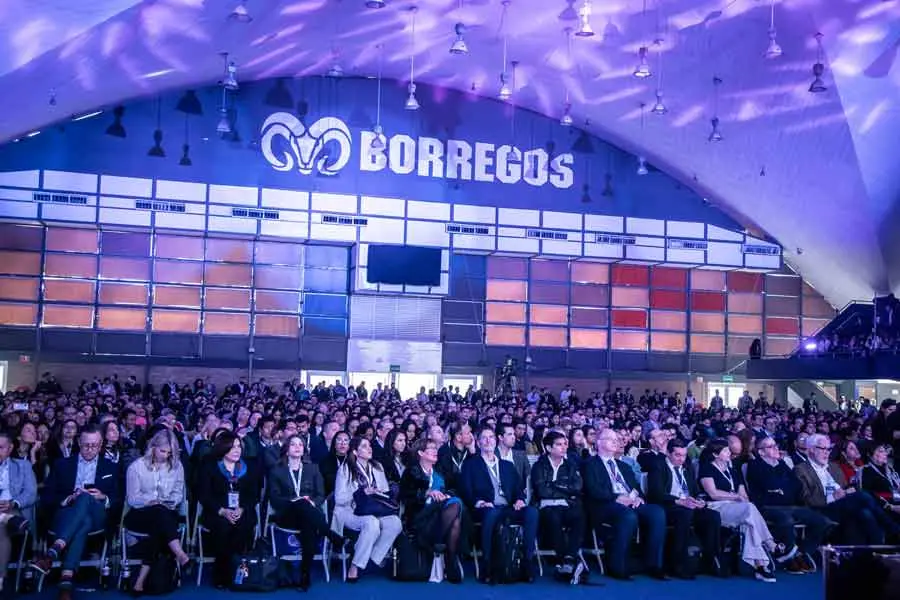
Implementing digital education
A report was presented during IFE Conference 2024 dealing with the importance and challenges of implementing digital education in higher education institutions not just with regard to technological aspects but also teaching practices.
The report “Digital Education in Universities: A Comprehensive Implementation Guide” addresses nine topics as a guide for universities.
Topics dealt with in the report include the reasons for implementing digital education, how to incorporate it into the educational model, the processes required to design a range of courses, regulations, and technological infrastructure, among others.
Driving online internationalization
According to Diego Quiroga, rector of Universidad San Francisco de Quito, and Thomas Schneider, executive director of the Association of Pacific Rim Universities (APRU), the best way to promote online education is through international partnerships.
The panelists insisted that before entering into such a partnership, you have to get to know the other party as well as possible to get the most out of the relationship.
- Educational transformation
Dr. Bharat Anand, Vice Provost for Advances in Learning at Harvard, shared his thoughts and foresight on where online higher education models will go over the next few years.
“The true power of digital education lies not in having a broader reach, but in the interactivity and connections that can be generated from the model.”
“The future lies in the potential that exists in strategic partnerships between universities and the willingness of the parties to work together,” he remarked.
He explained, for instance, that each university need not have its own web platform and that users could reap more benefits from shared courses instead.
He pointed out the variety of educational formats currently available: certificates, short courses, certifications, and master classes.
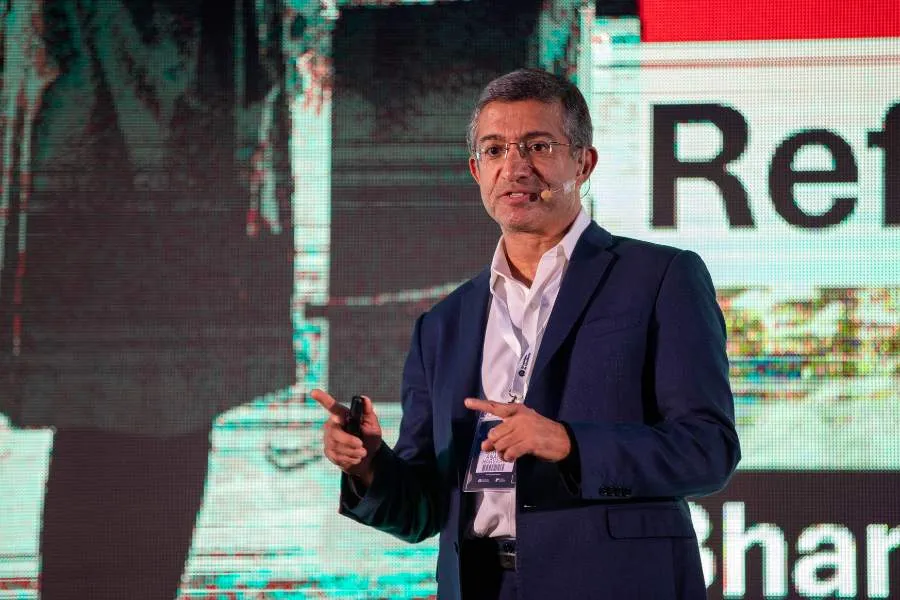
About IFE Conference 2024
The tenth edition of the Tec’s educational conference was held in a hybrid format on the Tec’s Monterrey campus from January 23 to 25.
Three thousand participants from 169 institutions in thirty countries attended.
With information supplied by Susan Irais, Ricardo Treviño, Mónica Torres, Nashiely Ojeda.
YOU MAY ALSO LIKE TO READ:

